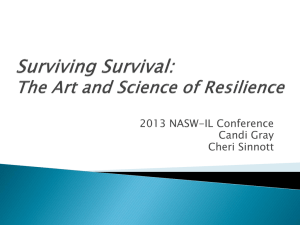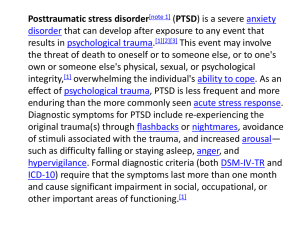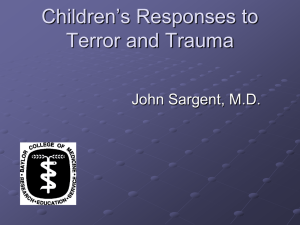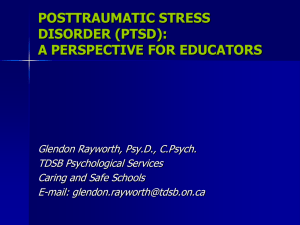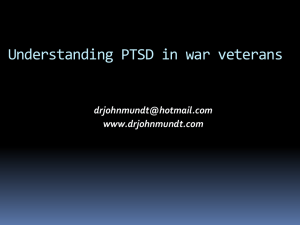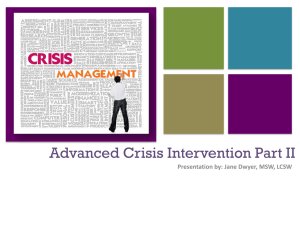Stress Management PPT
advertisement
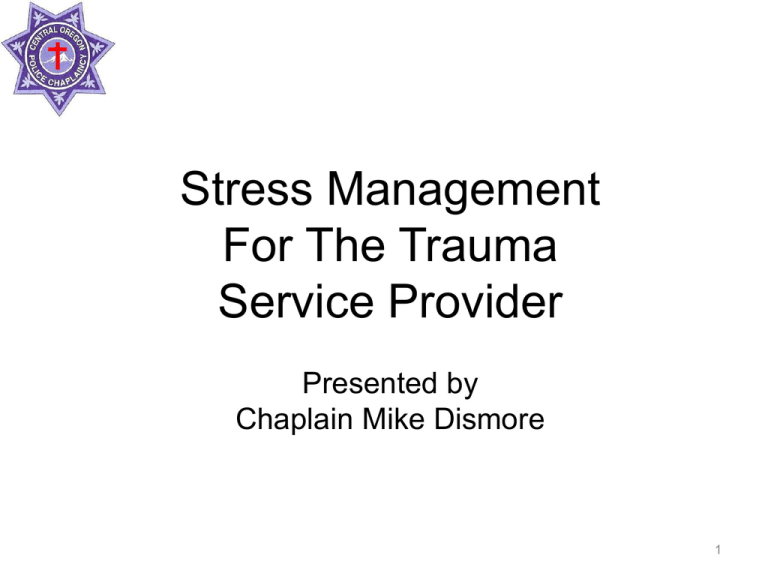
Stress Management For The Trauma Service Provider Presented by Chaplain Mike Dismore 1 Materials in this presentation were taken from the following resources • International Critical Incident Stress Foundation: Stress Management for the Trauma Service Provider by Rachel E. Kaul, LCSW, CTS and Victor Welzant, Psy.D. • Psychological Body Armor by George S. Everly, Jr., Ph.D., ABPP • Stress Management for Emergency Personnel by Chevron Publishing Corporation • The Relaxation & Stress Reduction Workbook • Stress Management for Dummies by Allen Elkin, Ph.D. • Why Zebras Don’t Get Ulcers by Robert Sapolsky 2 The Nature of Stress Stress is a state of physical and mental arousal. It is a normal and necessary part of life. Without the stimulation of stress, you would die. Stress helps us to make choices, develop plans, change our behaviors and begin new activities. Stress gives us energy and a drive to be our very best. Controlled stress can help us to be innovative, efficient and productive. 3 The Nature of Stress Extreme or prolonged stress is out of control. It can be destructive to the jobs performed by emergency service personnel. Uncontrolled stress is disruptive to our lives and our work. It produces deterioration in mental and physical health; diminishes our performance on the job and threatens our relationships at home. Unrestrained stress can alter someone’s personality and cause depression and even suicidal thinking. 4 What is Stress? Stress is a reaction to some stimulus or demand that produces an elevated state of arousal or readiness. The greater the stimulus, the greater is the stress reaction. 5 6 “The absence of stress is …” (Hans Selye) 7 Perception • The stress response is activated by our perception of events. • Our ability to change our interpretation of stressful events is a key to stress resilience! • “We are disturbed not by events, but by the views that we take of them.” Epictetus • Stressors can be real or imagined. 8 9 Awareness Exercise: Stressors • What are the unique stressors faced by the “trauma service provider”? • Consider both organizational and individual stressors. • Create a “Top Ten” list for each group. 10 What are the stressors at work? Individual Stressors Organizational Stressors 11 Awareness Exercise • What are your typical “early warning signs” of excessive stress? • What are the first changes that you notice in yourself? • What do others notice? • What signs do you pay attention to?…which signs do you ignore?…why? 12 Awareness Exercise How Do You Cope With Stress? A Self-Assessment 13 General Stress: Normal • Normal, routine stress of every day life and work. • Some negative, some positive, but all manageable. • People deal with it, recover from it, and stay healthy and actually grow from it. • Some do not deal with general stress and then it piles up. 14 Cumulative Stress: Destructive • Cumulative stress is a pile-up of unresolved general stress; it is abnormal and destructive. • Sometimes called “burnout.” • A long time stress exposure causes toxic or destructive levels. • Impairs of blocks job and home performance. • Threatens mental and physical health. 15 Cumulative Stress: Destructive • Strains personal and work relationships. • Warning signs are chronic fatigue, anxiety, depression and boredom. • Easily resolved if recognized early. • Ignore warnings and symptoms increase. Later symptoms become “locked in” and difficult to manage. Finally, symptoms become severe and cause considerable damage. • Severe cases require medical and psychological professional care. 16 17 Critical Incident Stress: Normal • Sometimes called “traumatic stress,” it is caused by exposure to horrible, terrible, awful, grotesque, overwhelming, frightening, threatening or disgusting events. • A normal, but painful, response of normal healthy people to an abnormal event. • Symptoms can be physical, emotional, intellectual, behavioral or spiritual. 18 Critical Incident Stress: Normal • Symptoms may last up to four weeks; beyond that period there may be a problem. • Most people recover from critical incident stress and remain healthy and productive. • If symptoms last beyond four weeks time, the normal critical incident stress may turn into a much more serious problem called Post Traumatic Stress Disorder (PTSD) that can impair or end a career. 19 Post Traumatic Stress Disorder: Destructive • Extreme or unresolved critical incident stress may cause PTSD. • About 10% of the general population develops PTSD over a lifetime. 15% to 30% of emergency service personnel develop it in their career. • People with PTSD feel “stuck.” They see, hear, feel, smell and taste the event repeatedly in their minds. • Disturbing thoughts, dreams and nightmares are common. 20 Post Traumatic Stress Disorder: Destructive • Those with PTSD avoid any reminders of the incident. • People with PTSD are over-aroused and expect a repetition of the terrible thing. • The diagnosis requires that symptoms last longer than 30 days. • PTSD causes significant changes to normal life pursuits. • PTSD requires professional treatment. 21 Contributing Factors to PTSD • Frequent exposure to horrific events considered outside the normal range of normal human experience increases PTSD potential. • The severity of the critical incident is a big factor. • Long duration of exposure contributes to PTSD. • Significant “hands on” contact with human misery, gory sights, sounds, smells, and sensations enhances the potential for PTSD. 22 Contributing Factors to PTSD • Previous experience can help us. However, the “pile-up” may also work against us. • Concurrent stressors (pregnancy, family illness or death, financial worries or other demands) cause greater vulnerability. • Severe traumatic events in childhood may increase the potential. • Intense guilt feelings or feelings of personal responsibility for what happened open a door to PTSD. 23 24 Compassion Fatigue • Empathy is a major resource for trauma workers to help the traumatized. • Trauma workers may have experienced personal trauma. • Unresolved trauma will be activated by exposure to similar themes in the client. • Children’s trauma is stressful for helpers. • Secondary traumatic stress. • Results from empathic connection to trauma survivor. • Post Traumatic Stress (PTS) symptoms develop in the helper. 25 Compassion Fatigue ProQOL R-V Professional Quality of Life Scale Compassion Satisfaction and Fatigue Subscales Revision 5 26 Sources of Stress Police officers, fire and rescue, and emergency medical personnel face many sources of stress. Stress reactions are very personal. What impacts one emergency person may not bother another. Awareness of potential stressors may help us to avoid some of them. 27 Personal Causes of Stress Personal beliefs that conflict with reality. Disappointment and loss of interest in the job. Performing worse than personal expectations. Excessive desire to do a perfect job. Excessively high personal standards and goals. Willingness to take serious or dangerous risks. Driven toward immediate satisfaction. Excessive detail orientation. High need to be in control. High need for exciting activity. Easily bored. Strong need to be needed and to rescue others. 28 Family-Related Causes of Stress Death, serious illness, accidents, moves, changes in the environment, damage to home. Family conflict and poor communications. Differences in values, needs and goals. Child rearing issues especially with special physical or mental needs. Important decisions made without the approval of family members. Financial difficulties. Differences or inequalities in household responsibilities and procedures. 29 Work-Related Causes of Stress Administrative hassles and poor leadership. Demanding bosses or too many bosses. Poor internal communication. Conflict with colleagues. Shift work or work overload. Low pay and poor advancement. No or limited health and other benefits. Uncertain job future or uncertain requirements. Frustrating contacts with the public. Personal danger and responsibility for others. 30 Traumatic Stress “Terrible Ten” Line of duty death. Serious injury to an operation person. Suicide of a colleague. Killing or wounding a colleague or innocent person. Disaster work. Events with extreme personal threat. Deaths or serious injuries to children. Knowing the victim personally. Events with excessive media coverage. Any unusual or extremely stressing event. 31 32 Danger Signals: Physical • Chest pain or difficulty breathing. • Excessive blood pressure. • Collapse from exhaustion. • Unusual heart beat patterns. • Signs of severe shock (weak pulse, pale color, excessive sweating, rapid breathing). • Excessive dehydration. • Dizziness. • Vomiting or having blood in feces. 33 Danger Signals: Thinking • Decreased alertness to surroundings. • Difficulties making decisions requiring immediate attention. • Disoriented (cannot estimate time; unsure of where they are; unsure of who they are). • Unable to focus on one thought at a time. • General state of mental confusion. • Seriously slow or disrupted thinking. • Cannot recall names of familiar equipment or people. 34 Danger Signals: Emotions • Panic reactions. • Numb, shock-like state. • Phobic reactions (extreme fear). • General loss of control of emotions. • Rage reactions and exaggerated emotions. • Overwhelming sadness that blocks action. 35 Danger Signals: Spiritual • Anger at God. • Questioning of basic beliefs. • Withdrawal from place of worship. • Uncharacteristic religious involvement. • Sense of isolation from God. • Anger at clergy. • Religious obsessions or compulsions. • Religious hallucinations or delusions. 36 Danger Signals: Behaviors • Significant changes in speech patterns. • Excessive anger at minor inconveniences. • Excessive crying or laughing. • Violent physical reactions; destroying property. • Curling up and rocking continuously. • Meaningless repeated actions. • Withdrawal from others and hiding. • Wringing hands, body shakes, and/or facial tremors. 37 38 Factors that Contribute to Stress • Suddenness – surprise causes more stress. • Intensity – how awful the experience. • Degree – how widespread is the impact. • Duration – the longer the exposure, the greater the harm. • Frequency – the more horrible events, the greater a potential for a problem. 39 Factors that Protect Someone from Stress • Training, education, experience – helps us to build up resilience. • Resource availability – the more resource, the better we cope. • Positive mental attitude – most important in stress control. 40 Stress Survival Skills: Before and During the Event • Prepare for emergencies by training and drilling. • Prepare equipment and maintain its readiness. • Gather information before deployment. • Follow legitimate directions of knowledgeable leaders. • Take rest breaks and nourishment. • Do not take personal blame for tragedies that befall others. • Maintain a positive mental attitude. 41 Stress Survival Skills: After the Event • Ready equipment for the next call. • Take care of yourself. • Avoid alcohol. It worsens the stress reaction. • Eat nutritious foods and get plenty of fluids. • Avoid or limit caffeine intake. • Physical exercise helps lower stress reactions. • Learn what you can from the experience. • Talk about the incident with trusted friends, colleagues or leaders. 42 Stress Survival Skills: Nutrition • Poor nutrition and bad eating habits can compromise performance, stamina and stress tolerance. • Avoid or limit caffeine (coffee, tea, chocolate, etc.). – Caffeine elevates blood pressure and heart rate and increases the need for oxygen. – Stimulates cardiac muscle and central nervous system. – Causes nervousness, sleeplessness and irritability. 43 Stress Survival Skills: Nutrition • Go easy on the soft drinks. Cool water is better. • Avoid fatty foods, salt, sugar and white bread. • Eat whole grain breads, hard cheese, dairy products, vegetables, fresh fruits, dried fruits and granola bars. 44 Stress Survival Skills: Nutrition • Don’t put alcohol on the top of your stressreduction list. – Negatively impacts performance, behavior, judgment and physical coordination. – Reduces the level of vitamins B and C and thus makes the body more vulnerable to stress and disease. – Suppresses rapid eye movement (REM) sleep, which is vital to our ability to process the traumatic experiences by natural means. 45 Stress Survival Skills: Nutrition • Don’t put smoking on the top of your stressreduction list. – Like caffeine, nicotine enhances stress reactions. – Nicotine depletes vitamins C and E and thus increases vulnerability to stress-related diseases. 46 Stress Survival Skills: Exercise • Increases muscle strength, lung capacity and physical stamina. • Lowers blood pressure and increases blood flow to tissues. • Improves sleep; lowers weight and cholesterol. • Reduces the severity of injuries should they occur. • Reduces the potential for injury during emergency operations. • Reduces the level of stress chemicals in the body. 47 Stress Survival Skills: Exercise • Be active and enjoy the exercise you choose. • Follow physician’s advice on exercise. • Start slowly and build up. • Exercise for 30 minutes at least three times a week; daily is better. • If exercise causes pain, stop and get checked. • Warm up and stretch before exercise. 48 Stress Survival Skills: Positive Mental Attitude • You make valuable contributions to people. • Stress is a challenge; overcome it. • Stress is controllable. • You can think, categorize, remember, visualize and anticipate a situation. • Find humor where you can every day. • Emotions should serve us, not dominate us. • Have a life beyond the job. 49 Stress Survival Skills: Positive Mental Attitude • Do not jump to conclusions. Review the facts. • Think first and then take action. • Self-blame and guilt distort reality. • Admit mistakes, apologize, correct what you can and move on. • Decide which battles are worth a fight. Then take a stand. • Avoid petty issues. 50 Stress Survival Skills: Spirituality Spirituality or personal beliefs are effective in stress management. People who believe in a caring God, a force, or power beyond and more powerful than themselves tend to cope with high levels of stress for longer times. Beliefs, prayers, mediation, contemplation and religious ceremonies are important for health. 51 Stress Survival Skills: Relaxation: Breathing • Voluntary control of breathing pattern is one of the most effective rapid methods to reduce excessive arousal. • Combat Breathing – Lt. Col. Grossman – Inhale the deepest breath possible and hold for 4 seconds – then exhale a count of four. – Exhale as much as possible and hold of 4 seconds – then inhale a count of four. – Inhale through the nose; exhale through the mouth. 52 53 Stress Survival Skills: Relaxation: Other Techniques • Meditation. • Progressive muscle relaxation. • Visual imagery. • Yoga or Tai chi. • Music. • Exercise. • Hypnosis. • Massage. 54 Stress Survival Skills: Personal Resilience Plan Step 1: Self Assessment What are my early warning signs of excessive stress? What do I do now on a daily basis for self care? What do I do on a weekly basis to improve self care? What do I do when my stress level is unusually high? What do I do to address the impact of vicarious trauma in my life? 55 Stress Survival Skills: Personal Resilience Plan Step 2: Planning for the future What can I add to my self care routine? (identify several if possible) How will I make time for these new strategies for self care? How often should I review what I am doing? What challenges do I expect to have with self care as I make these changes? How will I know if the changes are helping? What do I hope will be the important outcomes I 56 will notice as I improve self care? Stress Survival Skills: Personal Resilience Plan Step 3: Getting Support Who can I turn to for support with my plan? How often should I check in with him/her? What professional support is available to me if I need it? 57 58
